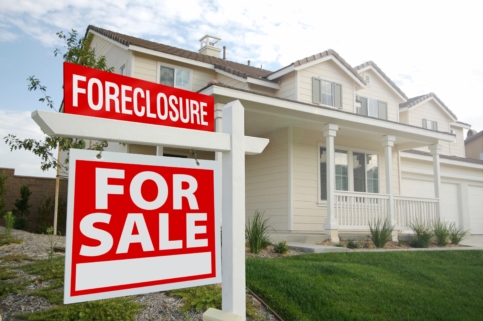Five Options To Stop Foreclosure
We are living in very volatile times, and things are no different for those of us who are going through foreclosure. Mortgage delinquencies surged to 7.76 percent in May and things aren’t looking good for millions of “homeowners” across America who may soon learn who truly owns their home. While there are moratoriums in place to keep you from losing your home they won’t be around forever and the clock is ticking. Whether you’re planning to stay in the home or not, there are four great ways for you to stop foreclosure and save your credit, including selling to investors.
Open Communication Is Crucial

Before we begin, it’s important to understand that open communication with your lender is the secret sauce that will improve your chances of stopping the foreclosure process.
If you haven’t already, pick up the phone and contact your lender right away if you’ve missed, or know you will miss, a mortgage payment. Their number can be found on the statements that you receive each month.
If you’ve received a notice of default, the number to the Loss Mitigation department will be prominently displayed on the notice.
I know it’s embarrassing, but the one thing that your lender wants is to discuss how they can help resolve your situation.
The lender doesn’t want you to lose your home either. They prefer that you stay in your home because that guarantees that they’ll receive their interest payments each month!
Loan Modification
Loan modifications are a great way to stop foreclosure if you’re planning to stay in your home. This is when the lender re-writes the loan, including delinquent payments and fees that have accumulated thus far, and restarts the amortization schedule.
While they are willing to increase the principal by rolling in those payments and fees, lenders will rarely ever approve a reduction in that principal of the loan.
There are a few criteria that most lenders look for when qualifying you for a loan modification. These criteria include:
- The loan is on your primary residence
- You’re going through financial hardship
- You have enough steady income to make the modified mortgage payments
There’s a lot of paperwork involved in a loan modification since you’re essentially buying the house all over again with different terms, but it’s definitely worth the effort since it stops the foreclosure and saves your credit!
Personal Loans
If you had a temporary loss of income and your overall situation hasn’t changed much due to your hardship, personal loans can be a good way to bring your mortgage current and stop foreclosure. You will need to pay all of your late payments as well as any late fees that have accumulated.
Before you make any payments to your lender, be sure to contact them and ask if any of the late fees can be waived as long as you bring your payments current that day. You’re providing them a fast solution to the problem and they may say yes!
Personal loans can come from many different sources including family, friends, investors, and institutional lenders.
Before taking on any additional debt, be sure to analyze your budget and confirm that your income will support any additional payments that will be required. Budgeting is considered an inconvenience by many people, but it can be a powerful tool.
Actively budgeting your income and expenses will relieve a lot of stress by giving you an objective view of your financial position from week to week.
A word of caution: Unless you’re dedicated to managing your money from this point forward borrowing more money can be a big risk. If you take on more debt and start missing payments again it can cause substantially more damage to your credit and make things much worse.
Before taking out any additional loans, discuss any loan modification opportunities you may have with your lender.
Tap Into Your Equity
As you make payments on your mortgage each month, you build equity which means that you have a financial interest in your home.
For example, if your home’s value is $180,000 and your mortgage balance is $110,000 you have $70,000 of equity in the property. This means if you sold the property you would receive a payout of $70,000 (minus commissions and fees).
You can leverage this equity and stop the foreclosure by either refinancing your property or taking out a Home Equity Line of Credit.
Refinancing
If you decide to refinance your property, your lender will first confirm that you have enough equity to preform the refinance. Once this is confirmed, they’ll roll your mortgage balance and any late payments or fees that you owe into a new loan and start the amortization over from the beginning.
Whether you’re able to refinance or not is largely dependent on the type of loan you have, but “Loans owned or guaranteed by government-sponsored entities Fannie Mae and Freddie Mac may qualify for a refinance under the Home Affordable Refinance Program, or HARP.” (sfgate.com)
Aside from protecting your credit, another big benefit to refinancing to avoid foreclosure is that you may also be able to lock in a lower interest rate!
Home Equity Line of Credit
Home Equity Lines of Credit (HELOCs) are another way to leverage the equity in your home and stop foreclosure.
HELOCs are simply a revolving credit line that adds another lien to your property, similar to your mortgage. That means if you were to sell the property, the mortgage and the HELOC would need to be paid off before you receive any money.
Since it’s a revolving credit line, you’re able to borrow money on demand, up to your credit limit, and use it for whatever you want! That means you can use it to bring your mortgage payments current and sleep well at night!
As stated in “Personal Loans”, be sure that your income will allow for the required payments for your HELOC.
Short Sale

A Short Sale is a last-ditch effort that you can make with your bank to stop the foreclosure process and save your credit. Your credit will still take a hit, but its effects are a lot more subtle than a full-blown foreclosure.
By definition, “A short sale in real estate is when a financially distressed homeowner sells his or her property for less than the amount due on the mortgage.” (investopedia.com)
This is not a short process. Between the paperwork, listing time, negotiations, and closing, you can expect a short sale to take upwards of 60 days or more. That’s only if your lender will agree to do one in the first place!
Short Sales work differently in different states. Here in North Carolina, most lenders require that the foreclosure property be listed with a real estate agent for a certain term that is decided on by them.
If the property has not been sold after that term, the lender will begin to gradually lower the price until the property sells.
When performing a short sale, lenders don’t just have a fire sale or auction for the property and get what they can. They methodically lower the price to make sure they recapture as much of their money as possible!
A major downside to a Short Sale is that some lenders may require you to pay for the difference between what they sold the property for and what you owe them! This is called a “deficiency balance.”
This means that if they sold the property for $130,000 and you owed $150,000, they could come after you for it and saddle you with another loan! That’s not ideal!
Discuss this with your lender before they initiate the short sale so you can make sure you’re not going to walk away with a deficiency balance!
Your lender is also going to be looking for the right buyer for the property. Buyers who are purchasing the property for their primary residence are considered over everyone else. This means that you’ll likely need to wait for them to qualify for financing with another institution before the purchase is confirmed.
Also, the property can still be foreclosed on while waiting for a short sale to complete, so be sure you have an experienced attorney working with you who can get the foreclosure postponed!
Selling It Fast
In some situations, it’s going to be better for you to sell your house fast and avoid the hassles and stress involved in your other options.
If you’re planning on leaving the home, local home buyers can stop foreclosure and buy the property in as little as 14 days. Homebuyers are investors who purchase properties, rehab them, rent them, or sell them immediately after purchase.
Since they’re not real estate agents and don’t typically work with traditional lending institutions, homebuyers can stop the foreclosure process by purchasing your property in two different ways.
Cash Purchase

A cash purchase is the simplest way to stop foreclosure. If you have enough equity in the property, the home buyer can simply pay off your existing loan and take ownership of the property.
Very few lenders will object to this and closing can be in as little as 14 days!
Purchasing Subject To The Existing Loan
Laws vary from state to state, but here in North Carolina, selling your foreclosure property subject to an existing mortgage to a savvy investor is a fast and easy way to stop foreclosure.
The process behind a “Subject-To” sale is beyond the scope of this article, but suffice to say that what the home buyer will be doing is bringing your loan current, taking over the payments, and transferring the property into a trust that they control.
There’s a bit more paperwork involved in this transaction, but it’s relatively simple and can stop the foreclosure process dead in its tracks!
Foreclosure doesn’t happen in a vacuum, which makes it very challenging emotionally. Everyone runs into trouble sometimes. While it may feel like the world is crashing down around you, taking action on any of these four options to avoid foreclosure will help you stay focused and stop the foreclosure before it ruins your credit!




Leave a Reply
Want to join the discussion?Feel free to contribute!